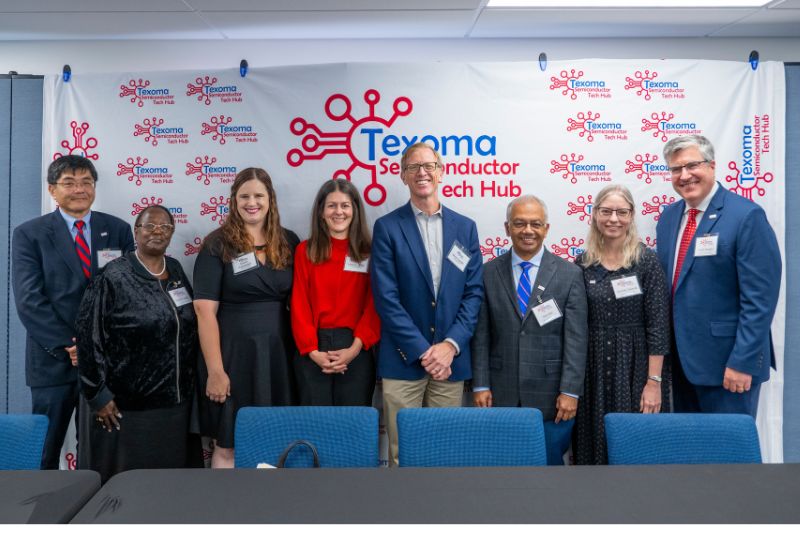DFW Educators Hear Plans for Training for High Paying Chip Industry Jobs
Industry leaders talk about curriculum development at Texoma Semiconductor Tech Hub event hosted by SMU, Jarvis Christian University.
DALLAS (SMU) – The message? High-paying jobs in the burgeoning semiconductor industry will follow the construction and expansion of the North Texas region’s manufacturing plants, and the Texoma Semiconductor Tech Hub (TSTH) is marshalling the training resources needed to fill them.
Leaders from GlobalWafers America and Texas Instruments (TI), companies with a major footprint in the semiconductor industry, spoke to a recent gathering of area educators hosted in South Dallas by Tech Hub members Jarvis Christian University and SMU. The industry expansion and workforce development supported by the Tech Hub presents a major opportunity for improving the quality of life in underserved communities, as much of the training for chip industry jobs will be made available through community college and adult education programs.
The TSTH plan calls for developing “stackable” educational pathways for students that would allow them to pursue incremental certificate training over time - an approach called "the ladder of success." Dorothy Langley, dean of Adult and Continuing Education at Jarvis, an HBCU, pointed out the need for educational institutions to "meet students where they are" to set them up for success.
Brent Omdahl, executive vice president for Government Affairs at GlobalWafers Co., Ltd., and Lauren Alder, workforce development manager at TI, both underscored career opportunities within the semiconductor industry. From manufacturing and technician roles to engineering positions, the industry offers promising future careers for both high school and college graduates, as well as those looking for new career pathways.
Semiconductors are the tiny electronic brains in the everyday technology we depend on, such as automobiles, washing machines and mobile phones. Several global trends, including the eruption of artificial intelligence, mean the demand for semiconductors will only continue to increase over the next decade. GlobalWafers Co., Ltd. is a leading manufacturer of silicon wafers, which are crucial components in semiconductor manufacturing. In 2022, the company selected Sherman, Texas, within in the Tech Hub region, as home for a new silicon wafer factory, the largest of its kind in the United States.
(From left) TSTH members J.-C. Chiao, Dorothy Langley, Karen Campbell, Lauren Alder, Brent Omdahl, Suku Nair, Jennifer Dworak and Scott Douglas.
Omdahl said he is elated that semiconductors are now on the public's radar and that GlobalWafers is proud to address the manufacturing gap for silicon wafers.
"Most of those manufacturing jobs require only a high school degree," said Omdahl. "So it's important for us to really, within the ISDs around where we are in Grayson County and in neighboring counties, to work with them. It's important for them to build some interest among high school students."
TI is currently completing construction on a new analog wafer fab plant in Richardson, Texas, and is also building four new plants in Sherman. Both projects are located within the Tech Hub region and, like the GlobalWafers factory, will require a larger, trained workforce.
“The need we’ve encountered over the past few years when we are ramping hiring and need to bring in a large number of technicians to ramp our factories is that talent is hard to find,” said Adler. “We are really starting to focus on entry-level technician talent and have community college partners, like Grayson College, who are developing or have developed programs to help upskill both current employees and incoming students.”
The goal of the SMU-led Texoma Semiconductor Tech Hub, one of 31 Tech hubs designated across the United States by the Biden Administration, is to support the national goal of increasing semiconductor manufacturing in the United States – specifically bringing “chip” jobs back to the North Texas and southern Oklahoma region over the next decade.
At the heart of the TSTH plan is the construction and distribution of Fablets™, shared lab facilities with mobile components that would provide Texoma communities across all 29 participating counties with access to semiconductor education and workforce training resources – the kind of training previously available only to those with access to sophisticated, expensive “clean room” facilities. The Fablet™ concept also will help introduce more middle and high schoolers to semiconductor production as a lucrative career opportunity.
Karen Campbell, Associate Dean of Academic and Workforce Instruction at Grayson College offered insight into the college's current programs, which provide students with the necessary certifications to build a robust resume.
"We're working with the Tech Hub on trying to get a floating instructor that can work with those mobile labs and service up to four rural high schools at a time so we can reach out and make sure that those student populations are served as well," said Campbell.
More information about the program and a full list of consortium members can be found at TexomaTechHub.org.
About SMU
SMU is the nationally ranked global research university in the dynamic city of Dallas. SMU’s alumni, faculty and more than 12,000 students in eight degree-granting schools demonstrate an entrepreneurial spirit as they lead change in their professions, communities and the world.
